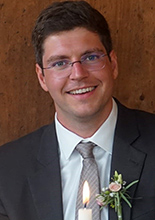DA alumnus Joep Roet on his career since graduating from MAIS 18 in 2015
 DA: You work for Neth-ER (Netherlands House for Education and Research) as a policy adviser. What exactly are your responsibilities on the job and how did your career path look like so far?
DA: You work for Neth-ER (Netherlands House for Education and Research) as a policy adviser. What exactly are your responsibilities on the job and how did your career path look like so far?
Joep Roet: As a policy adviser in Brussels, I follow what the EU is doing in the field of research. That means I keep track of what the Commission, Council and Parliament are up to. It involves speaking with officials and colleagues from other national offices, as well as frequent presentations or writing news articles for our website. At Neth-ER we use that information for two purposes. We inform our constituents back home about what’s going on in Brussels, e.g. research institutes and universities. And if the members of our association have something to say about the latest EU initiative, we make sure their voice is heard. For instance by talking to the Commission or Parliament, or by working with other organisations in Brussels.
Have you always been interested in European education and innovation policy, or has this interest developed over time?
As it happens, education and research policy were not at all on my radar when I saw the vacancy three years ago! But my interest has grown rapidly on the job, and I can see myself in this field for quite some time. It is a very dynamic field, which I really enjoy. I suppose it is inherent too, because science and innovation typically deal with novel ideas or discoveries that pose all kinds of legal and ethical dilemmas. It is also generally a positive environment because nobody is against research or education. In general, I would recommend DA students who want to work in Brussels to specialise in a field, because the EU is not looking for EU experts: they want people who can act on the EU’s behalf in a specific sector.
How has the DA helped you develop your career?
The DA has been immensely helpful! In hindsight, I benefit particularly from the interdisciplinary setup and the language classes. It is very helpful to have studied the different types of EU legal acts, while also knowing the historic background of EU integration and basic economic principles. I don’t have to be an expert. If I need legal advice, I can talk to a lawyer, and if I need an economic forecast, I talk to an economist. But because of the DA, I can speak their language and understand what they have in mind. Also, speaking French and German is an asset.
Is there a specific skill set taught at the DA that is particularly useful for your current job?
Well building on what I just said, it must be the ability to look at a problem from multiple angles and ask myself ‘what’s the issue here’. In policy, the answer is often not strictly legal, or strictly economic. There is always more to it: political or historical sensitivities that explain why certain decisions are made (or why a decision is being postponed ...). That is something you learn through the classes that the DA offers, but also because the DA is this cosmopolitan bubble where you talk to people from around the world, as well as the many study trips.
Where do you think will the future take you?
To the moon, if I am to believe the Commission’s latest research missions! Honestly, it’s tough to say, because I mostly end up somewhere completely different from what I had in mind. I wasn't planning to apply to the DA until I did. But it should be something in Brussels, related to EU policy and probably research and education.
[October 2021]